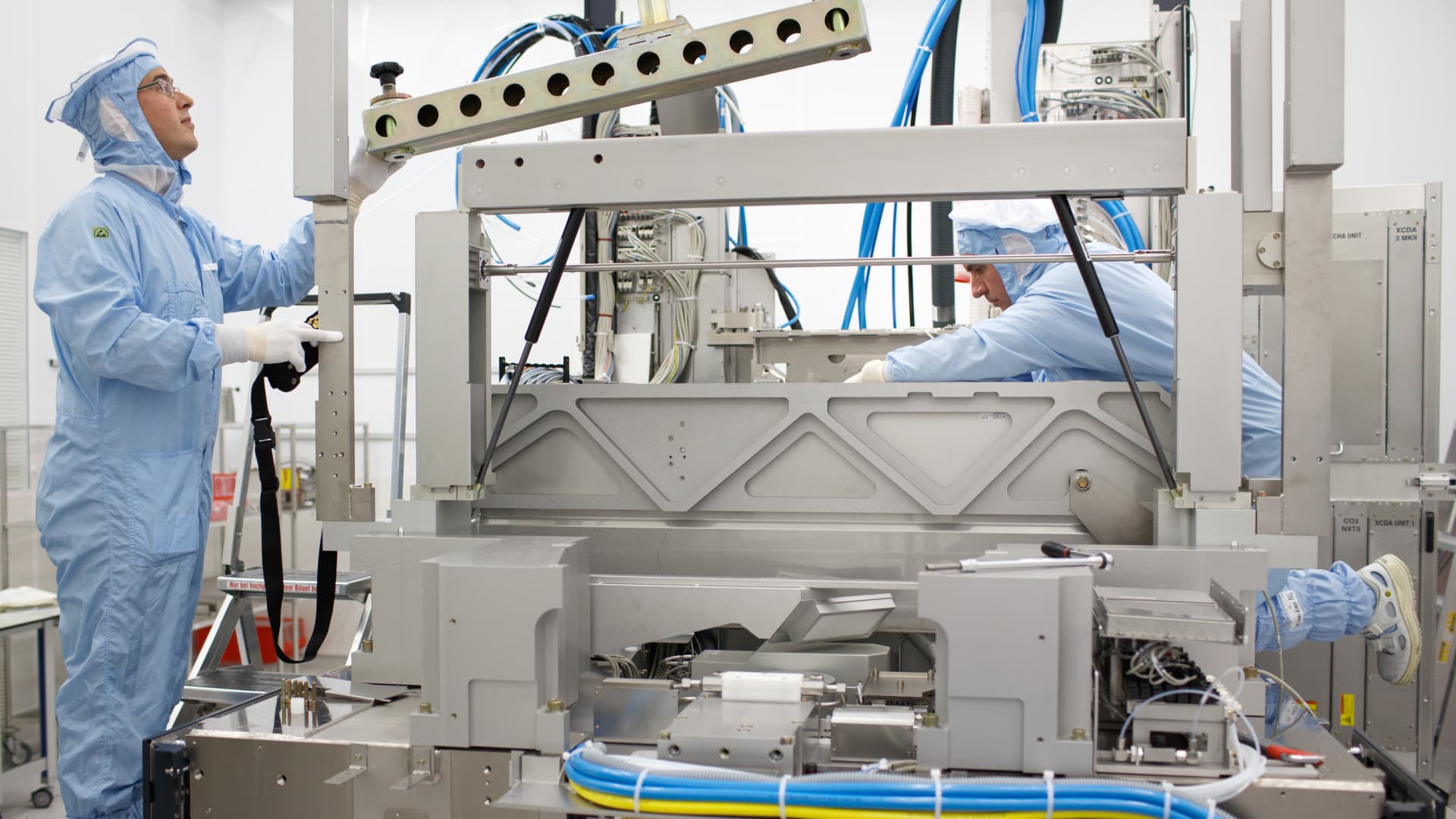European chip stock ASML “is almost in a quasi-monopoly position” to drive developments in artificial intelligence over the next decade, according to fund manager Marcus Morris-Eyton. ASML , a $380 billion Dutch company that’s also listed in the United States, makes machines required in the manufacturing of the world’s most advanced chips. Its customers include TSMC , which makes the AI chips designed by Nvidia , AMD and Intel , as well as Samsung and SK Hynix . The company dominates the market for lithography equipment, a central step in the chipmaking process in which beams of light are used to create the circuitry of chips. It is also the sole provider of extreme ultraviolet or EUV machines currently needed to make the next-generation chips as small as three nanometers. Morris-Eyton, co-fund manager for AllianceBernstein’s European Growth Portfolio , said ASML is going through a transition year due to excessive capacity in the semiconductor manufacturing space after a very strong 2023. He added that 2025 is likely to be “very strong”. The U.S. listed stock is up 25.6% in 2024. The AB European Growth Portfolio offers a diversified exposure to ASML with a 7.36% allocation. It’s also invested in chip industry giants Infineon , BE Semiconductor , and VAT Group. ASML 1Y line The company missed first-quarter sales expectations in April but beat profit forecasts. Shares fell by 7% on the day as the company provided what analysts labeled “soft” guidance for the current quarter. However, since ASML maintained its sales targets for next year, Wall Street analysts suggested that any pullback in the share price should be viewed as a buying opportunity. Wall Street analysts’ take “We also like ASML, as we believe that EUV orders from TSMC as well as other memory players are set to come through in the coming quarters,” said UBS analysts led by Francois-Xavier Bouvignies in a research note to clients on May 15. Similarly, Berenberg’s analyst Tammy Qiu dismissed the first-quarter underperformance, saying, “ASML’s orders will vary by quarter, so the lower-than-expected level in Q1 is not an indication that the group will not be able to achieve 2025 revenue guidance of EUR35bn.” “We do not expect any changes to [2024 earnings per share consensus] and keep confidence about ASML to deliver above that midpoint of €35bn in [2025 estimate],” said Bank of America analysts Didier Scemama and Marie Ganneval in a research note to clients on April 17. ‘Quasi-monopoly’ Morris-Eyton, who is also co-manager of AllianceBernstein’s Global Growth Portfolio , suggested that investors should overlook the short-term headwinds and make a long-term investment decision on ASML. “We’re not investing in ASML for a 12-month view,” he told CNBC Pro. “We’re investing in ASML because of their technology, which is almost in a quasi-monopoly position, which will accelerate many of the tech developments like AI for the next decade and decades to come.” Earlier this week, the company opened a test laboratory for its next-generation lithography equipment with Belgium chip research firm Imec. The laboratory in Veldhoven, Netherlands, years in the making, will give leading chipmakers and other equipment and materials supply companies an early chance to work with the 350 million euro ($380 million) tool, the first of its kind. The new “High NA” tool allows for up to 60% better resolution and is expected to lead to new generations of smaller, faster chips. The company reiterated that it expects customers to begin commercial manufacturing with the tool from 2025 onwards. “Ultimately, if you need AI, if you need [electric vehicles], if you need data centers, you need more chips,” Morris-Eyton added. “This means you need more EUV tools, and ASML is the only provider that can do those.” Wall Street analysts expect U.S.-listed shares of ASML to rise by 13% over the next 12 months to $1,076 from the current share price of $950, according to FactSet. European traded shares are expected to rise by 15.7% to 1,050 euros a share over the same period.



